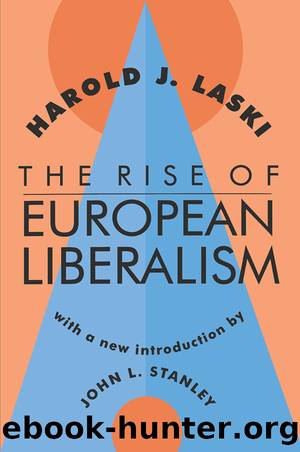The Rise of European Liberalism by Harold J. Laski

Author:Harold J. Laski [Laski, Harold J.]
Language: eng
Format: epub
Tags: Political Ideologies, Political Science, History, Conservatism & Liberalism, Politics, General
ISBN: 9781351302869
Google: hJRXDwAAQBAJ
Goodreads: 40002556
Publisher: Routledge
Published: 1936-06-01T00:00:00+00:00
IV
It is customary to call the period between the Reformation and the French Revolution the age of mercantilism ; and it is certainly true that until the latter part of the eighteenth century, there was no wide appreciation of liberalism in the economic field. But we must beware of thinking of mercantilist theory as a coherent body of doctrine in the sense of the classical economy of the nineteenth century. It was, as Adam Smith was careful to note, âpolitical economy considered as a branch of the science of a statesman or legislatorâ, not as a study of âthe nature and causes of the wealth of nationsâ.61 It assumed, that is, the inevitability, perhaps even the desirability, of a government which regulated the economic affairs of the commonwealth; and, for the most part, its discussion turned upon the principles that regulation should adopt. Its debates centre around problems which mostly assume interventionism, and, for that reason, its analysis of elementary postulates is naturally rare. It is not difficult to understand why despotic governments in this period should accept these views; they inherited the notion that economic life was subordinate to regulation from the medieval society out of which they emerged. And there is hardly a doctrine that we call mercantilist that is not capable of intelligible defence in the light of this fact. To multiply the precious metals, for instance, was an obvious objective to any ruler who desired an ample treasury for almost unceasing war. Military grounds, too, explain the enthusiasm of many mercantilists for a large population as a source of strength. The intensity of national rivalries explains why self-sufficiency should be regarded as an ideal, especially when there was ground for the belief that the trader as such is only too eager to subordinate his patriotism to the spirit of gain. The ideals of List and Fichte, the revival, in our own time, of economic nationalism, make it easy for us to understand their theory of the balance of trade. The view that in commercial matters my neighbourâs loss is not necessarily my advantage is one of the truths most difficult to persuade men to accept.
To grasp the essence of mercantilism certain aspects of it need special emphasis. Its doctrines are the confused and contradictory efforts of men to persuade their governments to support one interest rather than another. The exporter of cloth has a different policy to urge from that of its manufacturer ; and the sheep-farmer has a different view again. The governments wavered from time to time between the encouragement of monopolies and their prohibition. There are periods when alien immigrants are encouraged, and periods when they are frowned upon. Sometimes the export of bullion is eagerly advocated ; sometimes its export is attacked as meaning the loss of the nationâs wealth. We cannot understand mercantilism until we think of it as expressing an environment in which diverse interests are in constant competition to assure that the regulation is favourable to them. We cannot
Download
This site does not store any files on its server. We only index and link to content provided by other sites. Please contact the content providers to delete copyright contents if any and email us, we'll remove relevant links or contents immediately.
| Anarchism | Communism & Socialism |
| Conservatism & Liberalism | Democracy |
| Fascism | Libertarianism |
| Nationalism | Radicalism |
| Utopian |
The Secret History by Donna Tartt(19045)
The Social Justice Warrior Handbook by Lisa De Pasquale(12185)
Thirteen Reasons Why by Jay Asher(8889)
This Is How You Lose Her by Junot Diaz(6875)
Weapons of Math Destruction by Cathy O'Neil(6263)
Zero to One by Peter Thiel(5786)
Beartown by Fredrik Backman(5737)
The Myth of the Strong Leader by Archie Brown(5496)
The Fire Next Time by James Baldwin(5429)
How Democracies Die by Steven Levitsky & Daniel Ziblatt(5211)
Promise Me, Dad by Joe Biden(5141)
Stone's Rules by Roger Stone(5080)
A Higher Loyalty: Truth, Lies, and Leadership by James Comey(4948)
100 Deadly Skills by Clint Emerson(4919)
Rise and Kill First by Ronen Bergman(4777)
Secrecy World by Jake Bernstein(4740)
The David Icke Guide to the Global Conspiracy (and how to end it) by David Icke(4699)
The Farm by Tom Rob Smith(4502)
The Doomsday Machine by Daniel Ellsberg(4484)
